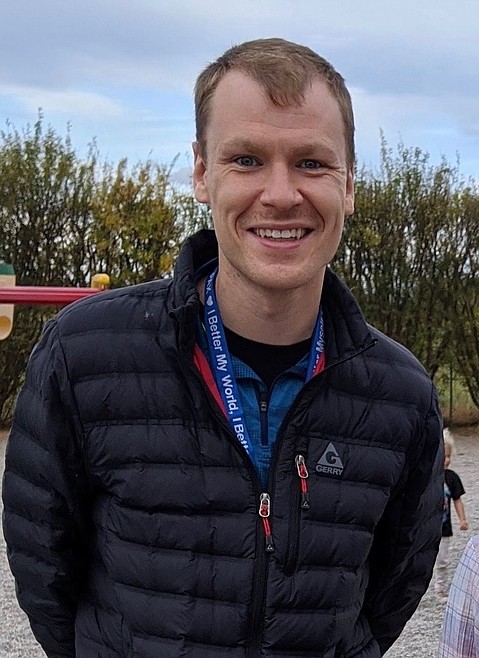Kindergarten educator has zest for teaching reading
HILARY MATHESON | Hagadone News Network | UPDATED 4 years AGO
As a kindergarten teacher, Derrick Criner knows that progress is a process and trying new things may lead to enriching experiences.
Initially, the 2013 Glacier High School grad thought he would go into nursing when he started college. He had taken many biology classes and his mother, who was a nurse, talked highly of the profession. However, by freshman year of college, he decided to make the switch to teaching after reflecting on how much he had enjoyed working for the Kalispell Parks and Recreation summer youth camp program — planning and leading children in games, activities and field trips. In 2016, he graduated from Montana State University-Bozeman with a degree in elementary education and a minor in reading for grades K-12.
When asked for his advice to other high school students who aren’t sure about what to do as a career he said, “Don’t be afraid to try new things.”
Trying new things that don’t always come easily takes practice and persistence. Reading is one example where all of the above paid off and he is halfway to completing a master’s degree in reading from Montana State University-Billings.
“Reading when I was a kid was really hard. I didn’t become a reader until fourth or fifth grade,” Criner said, noting the aid of school interventions and additional practice at home. “I think that helps me relate to kids having a really difficult time. I understand the struggle a little bit.”
As an undergraduate in elementary education, his college advisers pointed him in the direction of minoring in reading. He became more passionate about the subject after taking courses in how to teach reading and writing, where he learned how the brain functions in regard to comprehension.
“Reading is such a complicated thing to teach,” Criner said later adding, “Our brains are not naturally wired to read. They’re wired for spoken language, so reading is a new concept to everybody. For a 5- or 6-year-old it’s a lot. It’s miraculous what we’re able to do and what kids are able to do in a short amount of time.”
Criner stressed practicing reading at home on a daily basis goes a long way in helping children make progress.
“I tell parents a little goes a long way. If you’re driving in the car and the kids are in the back seat, have them read stop signs, or at breakfast, read the cereal box,” Criner said.
Then, he said, help children find what they love to read about.
“Just try everything under the sun,” he said.
BORN AND raised in Kalispell, Criner also didn’t anticipate he would return home after college.
“It was never in the plans,” he said. “You know, you go away to college and always say, ‘I’m going to go out and find new things and new places.’ After college, I took a job in Superior; it was so out of my comfort zone but gave me a really good perspective.”
After teaching second grade in Superior for two years, Criner found himself traveling often to Kalispell and Missoula. When he sought a new position, Cayuse Prairie School was one of the first to contact him for an interview. Taking his own advice on trying new things, he took the position.
“I never saw myself teaching kindergarten. Once I started doing it, I loved it,” he said.
Teaching kindergarten takes someone who is patient, flexible, highly organized but also creative and a strong communicator, among other traits.
“Everything is new in kindergarten. Children are starting at the ground level and going up — washing hands, holding pencils, putting things away. Kindergarten means going back to the basics. When I started teaching I assumed all kids can do this, but it’s a learned behavior,” which was a learning curve for himself after teaching upper grades he said. “You have to be very direct.”
Starting with the basics also means children come in at varying abilities, with a big factor being whether or not they attended preschool. In Montana, preschool is optional.
“I am very much a proponent of preschool. I can see a huge difference in kids who can go into preschool and who don’t,” he said.
“When the Common Core came into place a lot of first-grade skills moved to kindergarten, assuming a lot of kids went to preschool. We had to revamp how to teach kindergarten and move them a lot further along,” he said.
What makes teaching are the small things that come up during the year he said, a ‘thank you’ from a student or parent to the end-of-year highlight of seeing student progress.
“Especially in kindergarten, the highlight is always the end of the year. I keep student work and assessments to compare and there are huge drastic changes in what they’re able to do. Seeing the growth in kids and seeing how much they’ve learned over the course of the year — that’s the highlight.”
Reporter Hilary Matheson may be reached at 406-758-4431 or by email at [email protected].
ARTICLES BY HILARY MATHESON
Whitefish High School wins East Helena speech and debate tournament
Scoring 225 points, the Whitefish High School speech and debate team took first place at a weekend tournament.

Glacier High speech and debate team secures second in Bozeman
The Glacier High School speech and debate team secured second place, and Flathead High School, third in Bozeman.

Heritage Academy expands, moves to new location in Kalispell
Heritage Academy, a hybrid private and homeschool program referred to as a microschool, has moved to a new location, Easthaven Baptist Church, 2010 Whitefish Stage Road in Kalispell.

